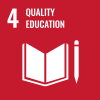Juba, 20 Dec 2021 – Sitting around a conference room table in South Sudan’s capital, Juba, Julius Onisente uses a stylus to emboss dots that form patterns to make a sentence.
The instructions he receives at the Buluk Eye Centre in South Sudan’s capital, Juba, could change his life. Julius lost his sight at the age of 19 years after a long illness.
“When I lost my sight in 1994, I was filled with frustration and felt limited,” says the 45-year-old. “I knew I was capable of doing much more, but it seemed that the world around me doubted me.”
Julius says he faced a lot of discrimination growing up. “My peers would laugh at me, and those who did not laugh at me took pity on me,” he says. “I still cannot decide which one is worse – the laughter or the pity.”
Julius is one of 20 people who attended a three-week Grade II Braille training at the Buluk Eye Centre organized by the International Organization for Migration (IOM) to help participants build on existing braille reading and writing skills.
“Running my hands through the dots and making sense of them is very empowering,” Julius says. “It gives me an avenue for me to take part in this world that I know I belong to.”
As a student at the University of Juba, Julius says keeping up with the pace of lectures has not been easy as he currently only has Grade I Braille, which is time-consuming to inscribe and requires a lot of specialized braille paper – expensive and hard to source in South Sudan.

An essential part of the IOM-organized training course was a braille typewriter. Photo: IOM/Liatile Putsoa
“I am confident that knowledge in Braille II will help me keep up with my studies so that I do not fall behind,” says Julius.
Another training participant is 37-year-old Emmanuel Stephen, who says he hopes that a Grade II Braille certificate will get him into university.
“Since the training, I have noticed the speed at which I can take notes using the Grade II techniques has increased,” Emmanuel says. “I did not think that I could cope in lectures with only Grade I but, with this training, I will feel confident to sit next to other students who are sighted and not feel like I am lagging behind.”
Such training is in high demand across South Sudan. The protracted civil war in the country has left many people vulnerable, especially those with disabilities.
“The training that we are facilitating here is just a drop in the ocean,” says Muneyi Muchanyuka, IOM South Sudan Protection Officer. “Beyond Juba, there are no training centres for people with visual impairments to learn braille writing and reading.”
IOM, together with partners, is working towards extending similar trainings to areas outside of the capital to ensure everyone in need of the services has access.
Flora Peter, who works as a braille instructor at Rajaf Educational Centre for the Blind, says the problem of lack of access to learning for people with visual impairments is too common.

Julius Onisente, who lost his sight after an illness, says the braille training course at the Buluk Eye Centre will make his university studies easier. Photo: IOM/Liatile Putsoa
“I worry about other people living with visual impairments outside of the city,” says Flora. “Those who do not have white canes, I wonder if they even know that braille exists. Our brothers and sisters in other parts of South Sudan are suffering a lot. They cannot get education and they cannot move alone.”
Flora, who is also attending the training, says that she hopes that training in Braille II will allow her to help her students advance. As a teacher, she says she will be able to prepare teaching materials and lessons much easier using Braille II techniques.
Flora studied nutrition but says that after seeing a growing need for educators who specialize in working with people with visual impairments, she decided to change course.
“I have never looked back since I started working with people with visual impairments in 2003 in Khartoum. I love my work and I love helping people,” she says.
She hopes all children, regardless of their physical ability, can have access to education.

Flora Peter attends the Grade II Braille course to improve her skills as an instructor at Rajaf Educational Centre for the Blind. Photo: IOM/Liatile Putsoa
“We have children who have never stepped inside a classroom simply because they are blind. We have adults for whom the thought of going to school is a distant dream,” says Flora. “This should not be the case. Whether you can see or cannot see should not limit your participation in society.”
In addition to being a braille instructor, Flora trains in orientation and mobility so that people with visual impairments can travel safely, confidently and independently, which also adds to their psychosocial well-being.
Written by Liatile Putsoa, IOM South Sudan Media and Communications Officer, Email: lputsoa@iom.int



